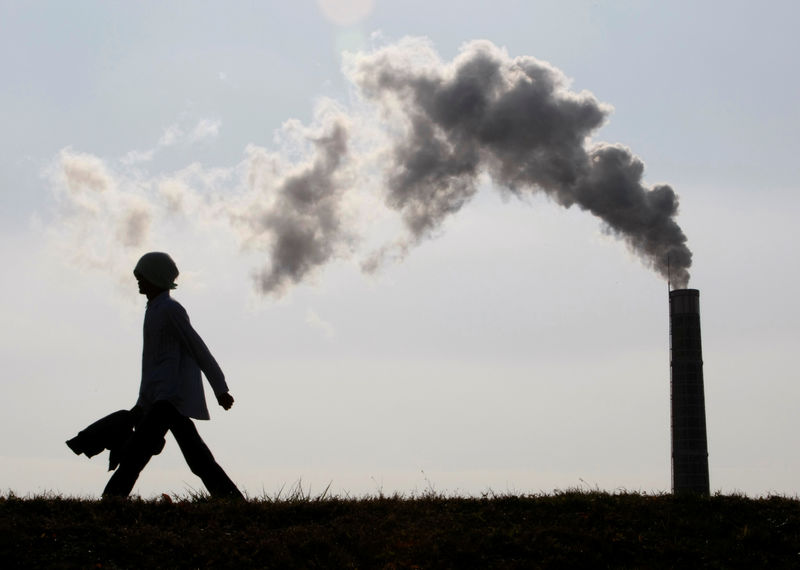By Leika Kihara and Tetsushi Kajimoto
TOKYO (Reuters) - Big manufacturers have more confidence in Japan's business conditions than they have had for a decade as a weak yen and robust global demand add momentum to the economic recovery, a closely watched central bank survey showed on Monday.
In a sign the recovery was broadening, small manufacturers' business confidence also hit a decade-high and the ratio of companies complaining of labor shortages was at a 25-year high, according to the Bank of Japan's "tankan" quarterly survey.
The upbeat data could help premier Shinzo Abe as he tries to convince voters in an Oct. 22 election that his "Abenomics" stimulus policies have improved their livelihoods.
It also supports Bank of Japan (BOJ) policymakers' hopes that a sustained economic recovery will boost wages and household spending, though many analysts expect inflation to remain distant from the central bank's 2 percent target.
"Big manufacturers' sentiment was probably driven by a weaker yen and hefty corporate profits," said Yuichiro Nagai, economist at Barclays (LON:BARC) Securities Japan.
"The tankan results were in line with or even stronger than the BOJ's scenario. But the price trend remains weak," he said, adding he expects the central bank to cut its inflation forecasts again at a rate review this month.
The headline index for big manufacturers' sentiment stood at plus 22 in September, handily exceeding a median market forecast of plus 18 to mark the highest level since September 2007.
It was higher than plus 17 seen in the previous survey in June, posting a fourth straight quarter of improvement, the tankan survey showed.
The big non-manufacturers' sentiment index stood at plus 23, unchanged from June and matching a median market forecast.Both big manufacturers and non-manufacturers expect business conditions to deteriorate in the next three months, the survey found, reflecting their concerns about uncertain outlook.
But big firms expect to increase capital expenditure by 7.7 percent in the current fiscal year ending in March 2018, roughly unchanged from their plans in June.
"The tankan shows that capital expenditure plans are on solid footing," said Norio Miyagawa, senior economist at Mizuho Securities. "A lot of firms are upgrading equipment or investing in labor-saving technology."
WEAK PRICES
The survey will be among data the BOJ board will scrutinize when it issues fresh long-term economic and price forecasts at a rate review on Oct. 30-31.
With inflation stubbornly low, some central bankers fret the BOJ may need to slash its price forecasts for the year ending in March 2018, say sources familiar with its thinking.
Japan's economy expanded at an annualized 2.5 percent in the second quarter on robust consumer and corporate spending, heightening hopes of a sustained recovery.
While slowing down from the second quarter's exceptionally fast growth, the economy is likely to have expanded 1.1 percent in the July-September period, according to a Reuters poll.
A separate survey showed Japanese manufacturing activity in September expanded at the fastest pace in four months, as domestic and export orders picked up.
But price and wage growth remain weak with firms still wary of passing more of their profits to employees, forcing the BOJ to push back the timing for reaching its price target six times since deploying a massive stimulus program in 2013.
The BOJ now expects inflation to hit 2 percent in the fiscal year ending in March 2020, arguing that a tightening job market and solid economic growth will gradually push up prices.
An index gauging firms' views of the job market showed that those complaining of labor shortages, rather than excess staff, were at the highest since 1992, the tankan showed.
Japan's jobless rate stood at a 23-year low of 2.8 percent in August, reflecting a strengthening economy and shrinking working-age population in a rapidly aging society.
Wary of increasing fixed costs, many firms make up for the shortage by hiring more temporary workers instead of raising salaries for their higher-earning permanent employees - a trend that has kept overall wage growth subdued.
"The economy is doing well. But our labor force is shrinking, so the shortage of workers that companies experience will get worse," said Miyagawa at Mizuho Securities.
"Companies know that wages aren't rising that much, so they are reluctant to raise prices. In this situation, the BOJ cannot exit from quantitative easing."
(Reportng by Leika Kihara and Tetsushi Kajimoto; Additional reporting by Stanley White; Editing by Eric Meijer)
